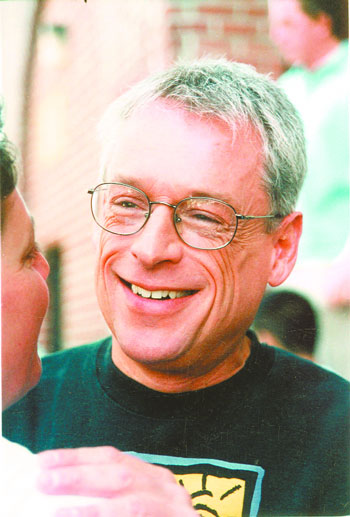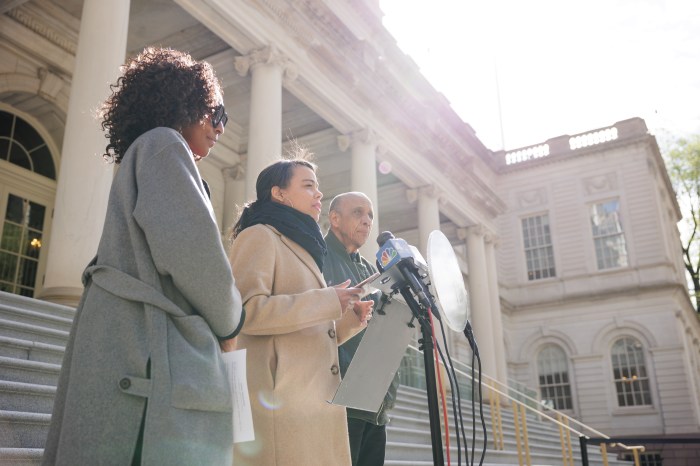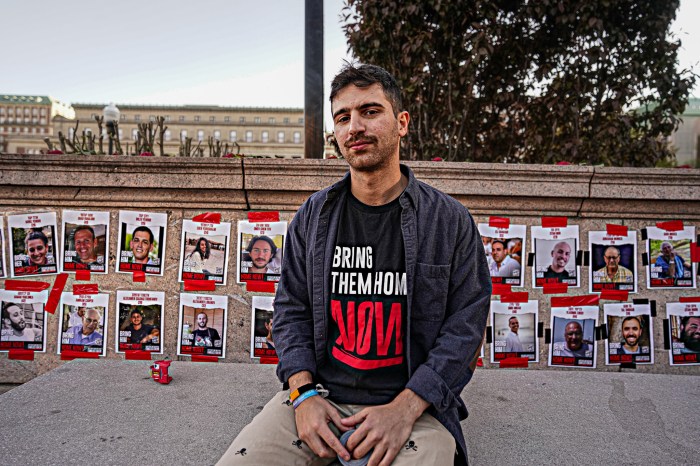Names Project fires Cleve Jones, who began AIDS memorial in 1987
Cleve Jones stitched together the first panels of what would become the AIDS Memorial Quilt in a San Francisco storefront in June of 1987. This past New Year’s Eve, the board of directors that runs the organization he created fired him in a dispute over how the quilt––now 45,000 panels strong––should be displayed.
Jones is suing.
Jones, who held the title of “founder” of the Names Project, the organization that now owns the quilt, worked for a year to bring the entire 55-ton collection of panels back to the Mall in Washington, on Columbus Day of this year. Jones thought the display, just one month before the presidential election, would bring world attention to the continuing AIDS epidemic and, with a sense of timing that his friends call prescience, also highlight the importance of gay rights in this year’s political debate.
The last display of the complete quilt, which Jones calls the “world’s largest work of art,” was also on the Mall in 1996. After the success of that giant effort––Jones said 1.2 million people saw the quilt then––the Names Project swelled to a high of 50 employees. But according to Jones, it became clear within six months that the organization could not support the expansion, which he said nearly bankrupted the group.
Mindful of the logistical problems of the 1996 display, the Names Project board refused to go forward with his plan. Angela Alioto, Jones’ high profile San Francisco attorney, contends that Jones had lined up more than $1 million in donations to finance the ambitious effort, which was to include stops along the way to Washington. But, according to Jones, the board vetoed his plans, saying they couldn’t afford it.
“But it wasn’t the display that hurt them,” contended Alioto, who recently ran unsuccessfully for mayor of San Francisco, “it was the expansion. The display made money.”
In his lawsuit, filed Tuesday in San Francisco Superior Court, Jones says the board refused to show him the financial data to back up their claim. When he protested, Jones said, the board turned down the pledges and fired him from his $41,500-a-year job.
In his suit, Jones is demanding that he be reinstated as executive director of the organization he founded. He hopes to move the quilt back to San Francisco, “the city of its birth,” he said.
Soaring rents in San Francisco forced the Names Project to move its operation to Atlanta in April 2001. At the time, Jones heralded the move, engineered by executive director Julie Rhoad who had ties in Atlanta, as a way of saving the organization.
Now Jones says that the organization has lost its vision and is floundering. Alioto claims that Rhoad is paid $110,000 per year to lead the 12-person, $1.5 million organization and has grown complacent. Jones has advocated “repurposing” the quilt, and targeting its message at the African American and other communities of color, where he says infection rates are soaring.
But Rhoad and Jones differ on approach. While she won’t discuss the specifics of the suit, in a telephone interview with Gay City News after the suit was filed, Rhoad talked about how the quilt is a “soft tactile way” to get the HIV prevention message to communities where infection rates are going up.
“AIDS thrives where there is racism, classism, homophobia, and stigma,” she said. “Our job is to be the soft easy way in to discussing these difficult topics.”
But Jones, 49, is an activist. He was on the front lines of early gay rights battles and was part of Harvey Milk’s “brain trust” in the 70s––Milk gave him his famous bullhorn when he was elected San Francisco supervisor, telling Jones to keep raising hell. He conceived the quilt during a 1985 march on San Francisco’s federal building to demand funding for AIDS research. According to friends, Jones’ idea of a soft approach is a padded battering ram.
“Historically, I think the period when the quilt was most useful was when it was being displayed regularly in its entirety,” Jones told Gay City News in a 2002 interview. “As much as things have changed, it’s important to adapt what we did well to the present situation. We’re thinking about how to make the quilt as useful to the African American and Latino community as it has been to the gay male community. We’re looking at specific strategies.”
Some critics of the Names Project complain that the quilt has disappeared from view as high-profile displays have declined, but Rhoad said there were “over 1000” displays of the quilt last year, most of them smaller exhibitions in schools and churches using fewer than 15 of the 12 x12 foot panels.
Jones also contends that there is only one HIV-positive person on the 15-member board, and that person was added in June 2003 at his insistence. Rhoad confirmed that there are two African Americans, one Latino, and what she called “a good mix” of gay and straight and male and female people on the board. Still, Jones is demanding greater board diversity.
Even Alioto, who has tried and won several high wire civil rights cases, conceded that Jones’ suit will be “a tough one.” Jones ceded control of the organization in 1990, when he was very ill with AIDS and didn’t get proper documentation of his agreement with the organization at the time. Jones says they promised him health insurance coverage for life, which he needs to pay what he says is a $20,000 annual bill for his AIDS medications. But Jones said the board threatened to stop paying for that too.
Jones’ friends worry that like many founders who have been ousted from organizations they started, the firing and the dispute will not just end Jones’ career, but will dampen his spirit and shorten his life.
Other observers worry that the rift between the organization that owns the quilt and the man that made it and has been its most articulate and forceful spokesperson, will so weaken the group that they will not be able to display it at all.
And only by seeing it, up close, can you read the names.
The quilt in its entirety is a collective scream of agony from the gay community. Some famous people are on it. Doctor Tom Waddell, the founder of the Gay Games, on panel 12, has a torch and a pink triangle and an inscription that reads, “United States Olympic Hero.”
But more importantly, the quilt is a memorial to each of the individuals who died, one by one, who once the ashes were scattered and the garage sale done, had no other chance at being remembered.
Franklin Dewayne Hendricks died when he was 23 in 1988. His panel reads, “Families are forever.” Neil Wallace’s “US Navy” panel reads, “Jesus loves me, this I know.” Richard Hathaway is “the brightest star in the sky.” Rick Calfin’s says “Welcome stranger to a more loving place.”
Some panels are just a name, and many are anonymous. Someone made a memorial to Scott “Babycakes,” on panel 485, “I miss you, but there was no reply,” it says. “I sat by my window and heard the moon sigh.” Another says “Clara, no one in the world will be like you.” “Victor” is remembered with some musical notes.
And panel 433 is red, decorated with pink hearts and sequins. In a careful script it reads, “Love you dad.”


































